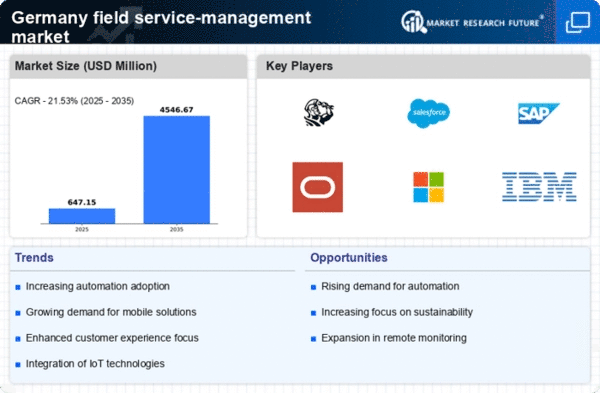Regulatory Compliance
In Germany, stringent regulatory requirements are shaping the field service-management market. Companies must adhere to various laws and standards, particularly in sectors such as energy, telecommunications, and healthcare. Compliance with these regulations often necessitates the implementation of advanced service management solutions that can track and report on compliance metrics. This need for regulatory adherence is driving investments in field service technologies, as organizations seek to avoid penalties and enhance operational transparency. The market is projected to grow as businesses increasingly recognize the importance of compliance. This recognition helps maintain their competitive edge and ensures customer trust.
Workforce Optimization
The field service-management market in Germany is significantly influenced by the need for workforce optimization. As labor costs rise, companies are compelled to maximize the productivity of their field technicians. This has led to the adoption of advanced scheduling and dispatching tools that enhance workforce efficiency. By utilizing data analytics, organizations can better allocate resources and reduce travel time, which can lead to cost savings of up to 20%. Furthermore, the demand for skilled labor in the service sector is increasing, prompting companies to invest in training and development programs. This focus on workforce optimization is likely to drive growth in the field service-management market.
Technological Advancements
The field service-management market in Germany is experiencing a surge due to rapid technological advancements. Innovations such as IoT, AI, and machine learning are transforming how service operations are conducted. These technologies enable real-time data collection and analysis, which enhances decision-making processes. For instance, the integration of IoT devices allows for predictive maintenance, reducing downtime and improving service efficiency. According to recent data, the adoption of AI in service management has the potential to increase operational efficiency by up to 30%. As companies in Germany invest in these technologies, the field service-management market is likely to expand significantly, driven by the need for improved service delivery and customer satisfaction.
Customer Experience Enhancement
Enhancing customer experience is a pivotal driver in the field service-management market in Germany. Companies are increasingly recognizing that superior service can differentiate them in a competitive landscape. This has led to the implementation of customer feedback mechanisms and service level agreements (SLAs) that prioritize customer satisfaction. Data indicates that organizations that focus on customer experience can achieve a 10% increase in customer retention rates. As businesses strive to meet and exceed customer expectations, investments in service management solutions that facilitate better communication and responsiveness are expected to rise, further propelling the market.
Integration of Mobile Solutions
Mobile solutions are transforming the field service-management market in Germany. With the proliferation of smartphones and tablets, field technicians can access critical information and tools on-the-go. This mobility enhances their ability to respond to customer needs promptly and efficiently. Recent studies suggest that mobile-enabled service management can improve first-time fix rates by up to 25%, which is crucial for customer satisfaction. As organizations continue to embrace mobile technology, the field service-management market is likely to see substantial growth, driven by the demand for agile and responsive service delivery.
















